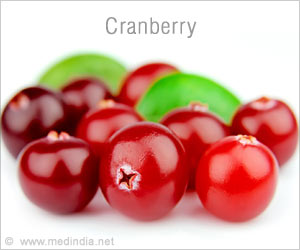Cranberries play an important role in supporting good blood vessel function and improving cardiovascular health.
- Cranberries aid in improving the flow-mediated dilation (FMD), thereby, reducing heart disease risk
- FMD is a biomarker of heart disease risk and measures how blood vessels widen when blood flow increases
- Cranberries can even affect vascular health in people with low cardiovascular risk
Dr. Ana Rodriguez-Mateos, Senior Lecturer in Nutrition at the Department of Nutritional Sciences at King’s College London and senior author of the study, said: “The increases in polyphenols and metabolites in the bloodstream and the related improvements in flow-mediated dilation after cranberry consumption emphasize the important role cranberries may play in cardiovascular disease prevention. The fact that these improvements in cardiovascular health were seen with an amount of cranberries that can be reasonably consumed daily makes cranberry an important fruit in the prevention of cardiovascular disease for the general public.”
Low consumption of fruits and vegetables is one of the top modifiable risk factors associated with a higher incidence of cardiovascular disease worldwide. Growing evidence continues to link the polyphenols from berries with heart health benefits. Cranberries are rich in unique proanthocyanidins that have distinct properties compared to polyphenols found in other fruits.
This study explored whole cranberry freeze-dried powder, equivalent to 100g of fresh cranberries, and its impact on cardiovascular health. The results demonstrated that consumption of cranberries as part of a healthy diet can help reduce the risk of cardiovascular disease by improving blood vessel function.
An initial pilot study was completed with five healthy young men to confirm the biological activity of the whole cranberry freeze-dried powder. The pilot concluded that cranberry consumption increased FMD and confirmed dosing.
The study found significant improvements in FMD two hours after first consumption and after one month of daily consumption showing both immediate and chronic benefit. In addition, metabolites were also identified and predicted the positive effects seen in FMD. These results conclude that cranberries can play an important role in supporting cardiovascular health and good blood vessel function.
To read the study in its entirety, the Food & Function article can be accessed here: Daily consumption of cranberry improves endothelial function in healthy adults: a double blind randomized controlled trial.
The study was supported by The Cranberry Institute, the Research Committee of the Medical Faculty of Heinrich-Heine University Dusseldorf and a Susanne Bunnenberg Heart Foundation grant to Dusseldorf Heart Centre.
Source-Eurekalert
















